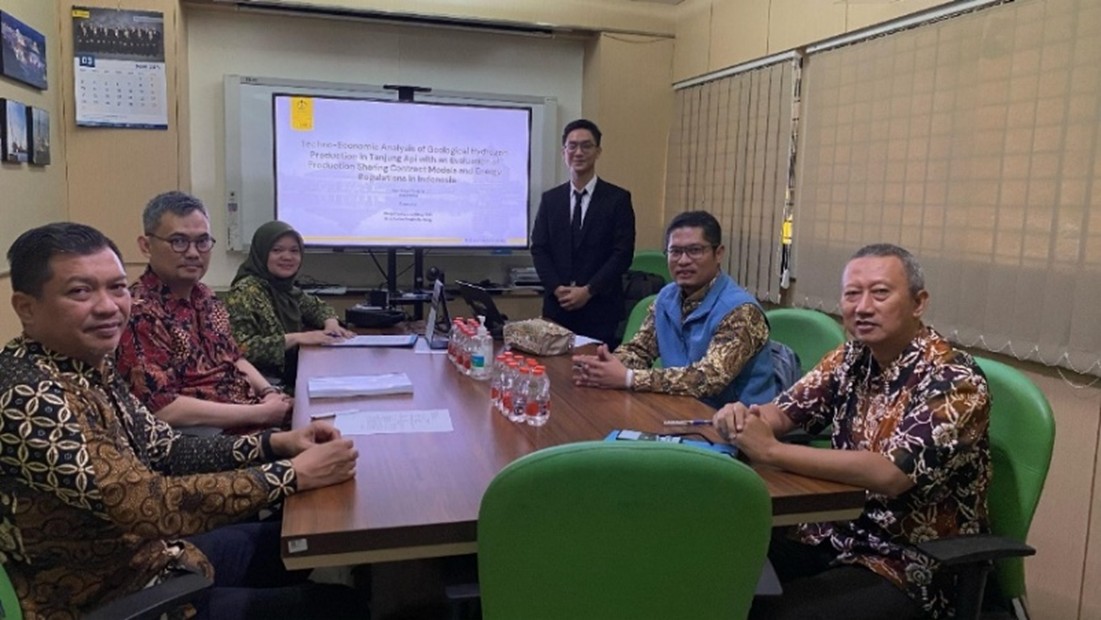Depok, May 9, 2025 — Deni Suryo Pratama, a 2021 undergraduate student from the Department of Chemical Engineering, Faculty of Engineering, Universitas Indonesia (FTUI), has studied the potential for geological hydrogen production in Indonesia. His research, titled “Techno-Economic Analysis and Regulatory Evaluation of Geological Hydrogen Production in Tanjung Api, Sulawesi”, was carried out at the Directorate General of Oil and Gas (Ditjen Migas) – Ministry of Energy and Mineral Resources (ESDM).
The study focuses on the Tanjung Api area in Central Sulawesi, which, according to a 2024 publication by the Geological Survey Center of the Geological Agency under the Ministry of ESDM, contains natural hydrogen concentrations reaching up to 35.56% in natural gas seeps. This discovery makes Tanjung Api one of the most promising sites in Indonesia for developing clean hydrogen-based energy.
To optimize this potential, Deni proposes using Pressure Swing Adsorption (PSA) technology, which can produce hydrogen with 99.99% purity and a recovery rate of 87.4%. The economic evaluation used Net Present Value (NPV) and Internal Rate of Return (IRR) approaches.
Deni explained that his findings show the Gross Split – Non-Conventional scheme (95% for the contractor and 5% for the government) as the most economically viable option. “If natural gas is sold as a by-product, the Levelized Cost of Hydrogen (LCOH) can be reduced to 3.89 USD/MMBTU. However, without the sale of natural gas, the LCOH significantly increases to 13.39 USD/MMBTU,” Deni stated.
The sensitivity analysis conducted in the study also indicates that the production flow rate plays a critical role in determining the project’s economic feasibility. Additionally, the Cost Recovery scheme was more sensitive to variable changes than the Gross Split scheme, requiring more careful technical implementation.
“If this research is implemented in real-world settings, the production of geological hydrogen from regions like Tanjung Api could serve as a sustainable clean energy alternative while reducing Indonesia’s dependency on fossil fuel imports,” said Deni.
Beyond supporting the Net Zero Emissions 2060 target, this technology also has the potential to create new jobs, enhance national research capacity, and provide an environmentally friendly energy source for both industry and local communities—particularly in eastern Indonesia, which is rich in resources but limited in energy infrastructure.
As a result of this research, Deni proposed the establishment of the Center of Hydrogen Excellence Indonesia—a collaborative hub for academics, government, industry, and communities to strengthen hydrogen technology research and innovation, human resource development, and energy transition efforts toward the 2060 target. Deni hopes his study can be an initial reference for future strategic policy-making.
The research supervisor, Cindy Dianita, S.T., M.Eng., Ph.D., remarked, “This research holds a high degree of novelty as it is one of the first studies in Indonesia to examine natural hydrogen from both technical and economic feasibility perspectives. Deni’s findings are also being considered as a reference by the Ministry of Energy and Mineral Resources in formulating regulations related to hydrogen development in Indonesia. This proves that even undergraduate research can have a real impact on national policy direction.”
Prof. Kemas Ridwan Kurniawan, S.T., M.Sc., Ph.D., Dean of FTUI, also expressed his appreciation for this achievement, stating, “This research marks a significant milestone in the exploration of new energy sources in Indonesia. Universitas Indonesia, through the Faculty of Engineering, is ready to take a leading role as the country’s first hub for hydrogen research, technology innovation, and policy development. We believe that through cross-sector collaboration between academia, industry, government, and society, Indonesia can advance clean energy supporting the energy transition and the Net Zero Emissions 2060 goal.”
***
Public Communications Office
Faculty of Engineering Universitas Indonesia


